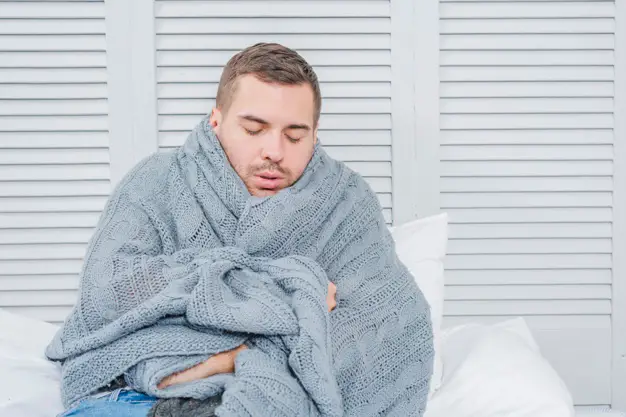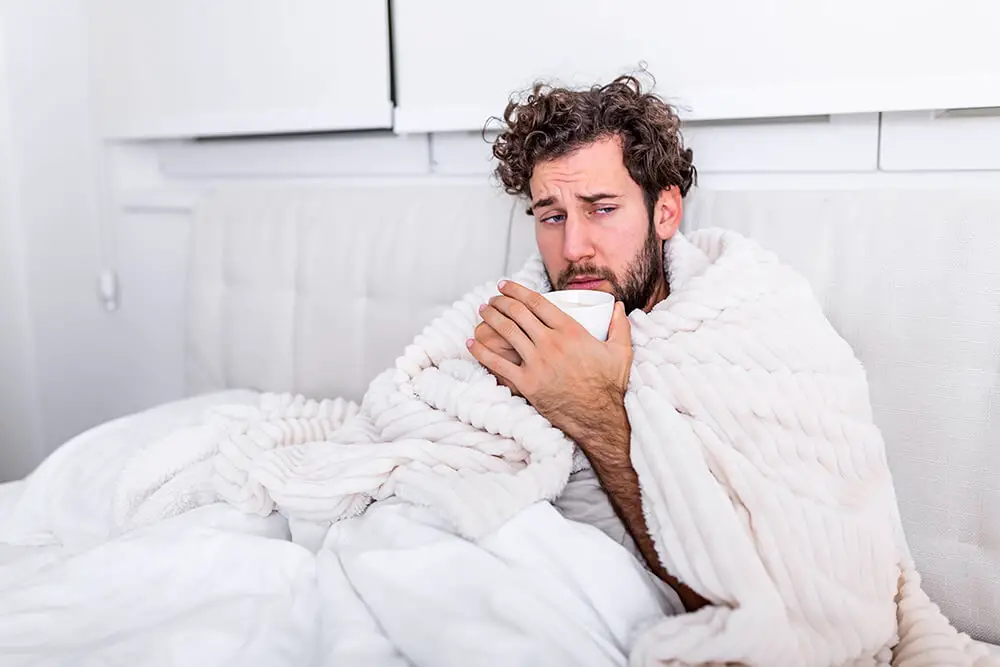Have you ever noticed that after enjoying a couple of drinks, you suddenly find yourself feeling chilled and shivery, even in a warm room? It’s a common experience that many people have had, and it makes them wonder why alcohol has this paradoxical effect on their bodies.
In this blog, we are delving into the science of why you feel shivering cold after drinking alcohol. By the end, you will have a clearer grasp of how alcohol influences our body’s temperature regulation and how you can prevent that from happening.
Table of Contents
ToggleAlcohol Poisoning and Hypothermia
Alcohol poisoning unfolds when the body’s delicate equilibrium is disrupted by an overwhelming surge of alcohol. The amount that triggers alcohol poisoning can vary based on factors like age, sex, size, weight, how fast the alcohol is consumed, whether the person is on an empty stomach or not, general health, and the use of medication or drugs.
Alcohol’s Effect on Your Body Temperature
Alcohol poisoning can bring about a concerning consequence: it can make your body temperature drop, increasing the risk of hypothermia. Hypothermia develops when your body sheds heat faster than it can generate it, leading to a decrease in your core temperature below its typical range.
When alcohol poisoning occurs, it can cause your blood vessels to get wider (like they are expanding), which might make you feel warm at first. However, this can cause your body to lose heat rapidly, even if you are in a warm environment. As your body temperature falls, you might start shivering and experiencing a cold sensation.
The Struggle to Keep Temperature Balanced
Our bodies are designed to keep our temperature steady – it’s like having an internal thermostat that ensures we’re neither too hot nor too cold. This regulating process is known as thermoregulation, which is disturbed by the introduction of alcohol into the system.
Alcohol throws off the hypothalamus’s ability to correctly manage our body temperature. This interference can lead to a mix-up between our brain and the body’s systems that control temperature. This mix-up can cause us to feel cold even when the surroundings are warm.
Hangover Fever vs. Hypothermia: Clearing up Misconceptions

It’s a common notion that a hangover can give you a fever, but that’s not the case. While a hangover can bring about various discomforts, having an actual fever isn’t typically one of them. A fever typically indicates that your body is battling an infection or dealing with an illness – and a hangover itself doesn’t fall under that category.
Alcohol’s Role in the Sensation of Warmth and Shivering
Interestingly, alcohol can play tricks on our perception of temperature. When we’re intoxicated, alcohol causes our blood vessels to expand, which makes us feel a warm sensation on our skin. This sensation can sometimes trick us into thinking that our entire body is warmed up. However, this is a bit deceptive. The truth is, while our skin feels warm, our core temperature can actually drop due to increased heat loss.
Additionally, alcohol poisoning’s impact on the brain’s temperature control can lead to shivering – our body’s natural way of generating heat. This can further contribute to the feeling of warmth, even if our overall body temperature is decreasing.
Concerns and Effects on the Nervous System
Alcohol has a significant impact on our central nervous system (CNS), which controls our thoughts, movements, and senses. Once alcohol enters our bloodstream, it hampers the speed of nerve activity in the brain, leading to various effects. One key player in this process is the neurotransmitter called gamma-aminobutyric acid (GABA). GABA inhibits nerve activity, which is why alcohol’s interaction with GABA results in relaxation, sedation, and a general slowing down of the brain’s functioning.
Another neurotransmitter, glutamate, does the opposite of GABA. It stimulates nerve activity and contributes to stress responses like sweating, increased heart rate, and even tremors. Alcohol alters glutamate receptors, making them more sensitive. This heightened sensitivity causes an increase in stress-related responses, which can lead to shaking and trembling after drinking.
5 Tips for Preventing Cold Shivers After Drinking Alcohol
After a night of fun and socializing, the last thing you want is to find yourself shivering with cold. If you’re looking to avoid those chilly after-effects of alcohol, here are some handy tips to consider:
1. Hydrate
Try to switch between alcohol and water or any other mixed drinks to stay hydrated. This can help balance the dehydrating effects of alcohol and keep your body temperature more stable.
2. Dress in Layers
Wear multiple layers of clothing that you can easily adjust. This way, you can accommodate your body to changing temperatures and prevent sudden temperature drops due to drinking.
3. Pace Yourself
Maintaining awareness of the quantity of alcoholic beverages you consume within a specific period can greatly impact how your body processes the alcohol. By allowing your body more time to metabolize each drink, you’re effectively helping to moderate its effects, including the potential for feeling excessively cold.
4. Eat Beforehand
Opt for foods rich in carbohydrates and healthy fats, like whole grains, lean proteins, nuts, and avocados, before consuming alcohol. When you eat a substantial meal before drinking, you create a protective barrier for your body, slowing down the alcohol absorption process.
5. Assess Your Limits
Be attuned to the impact that alcohol has on your body personally. If you start feeling unusually cold or shivery, it might be time to take a break from drinking.
Conclusion
Alcohol, though it might give a momentary feeling of warmth, can actually lead to shivers and discomfort. As your body processes alcohol, blood vessels widen, leading to heat loss and that chilly sensation. Understanding how alcohol affects your body’s temperature regulation is the key to dealing with this phenomenon.
As much as you enjoy drinking at your social gatherings, you must remember that a little awareness goes a long way. By keeping these insights in mind, you can have the best nights out without being taken by surprise by unexpected shivers. Cheers to staying warm and informed!

I am a passionate beer connoisseur with a deep appreciation for the art and science of brewing. With years of experience tasting and evaluating various beers, I love to share my opinions and insights with others and I am always eager to engage in lively discussions about my favorite beverage.
















